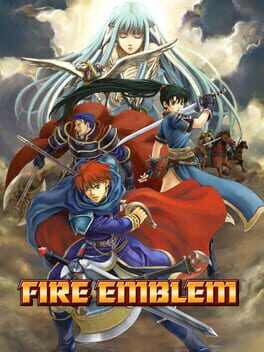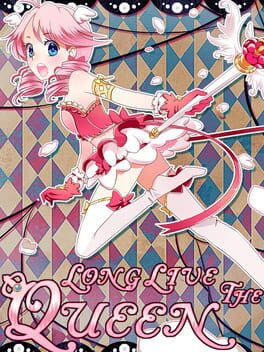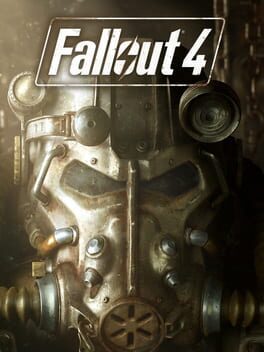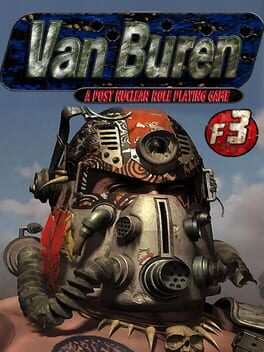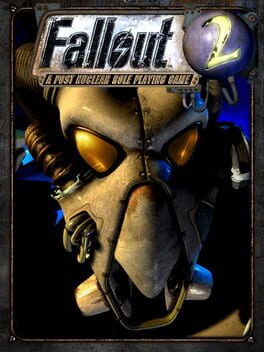alivedovedoeat
Recent Activity
alivedovedoeat
completed
Fire Emblem: The Blazing Blade
Gets a bad rap among more hardcore players for being a slow introductory title, but Eliwood Normal was plenty difficult for me back before I'd done my requisite wiki-diving. Not every Alexander O. Smith localization is a winner, but his strengths really come through in this one and elevate an otherwise mediocre JRPG script to something memorable.
7 hrs ago
alivedovedoeat is
now playing
The Legend of Heroes: Trails in the Sky
7 hrs ago
alivedovedoeat
completed
Fallout: New Vegas
20 hrs ago
21 hrs ago
alivedovedoeat
commented on
alivedovedoeat's
review of
Fallout 4
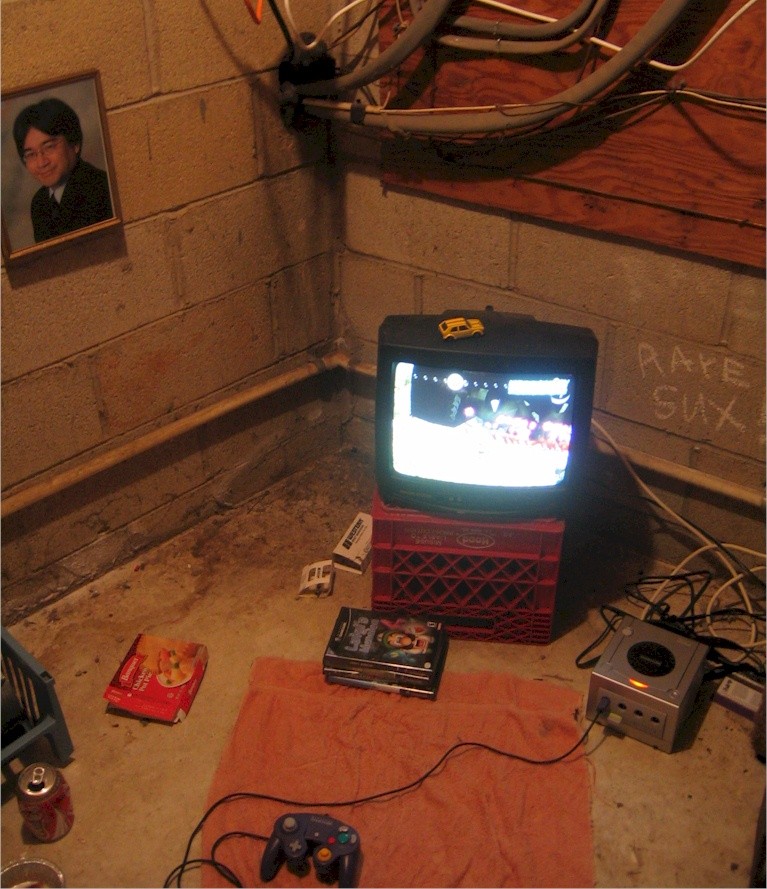
@quby two stars, not one of the better chocolate pairings. yesterday I had chocolate alongside challah and that was like three and a half
21 hrs ago
alivedovedoeat
finished
Long Live the Queen
A lot more mechanically shallow than other games in its genre, but benefits from this in that it can viewed holistically more easily than something like Tokimeki or Princess Maker. Representative of a more reflexive era of VN pastiche, one not exactly witty but so much less maudlin than what was to come.
1 day ago
alivedovedoeat
followed
epiglottis
1 day ago
1 day ago
1 day ago
1 day ago
alivedovedoeat
finished
Fallout 4
I've been keeping up with the tabletop game Wolves Upon the Coast lately, part of the current glut of fantasy heartbreakers but distinguished by some mechanical novelty in service to its focus on sacrifice in the pursuit of power. Where most games in this genre award character advancement based on the acquisition of wealth, Wolves grants the equivalent of a level each time a player boasts that she'll accomplish something difficult, dangerous, and impractical. There's a fanzine which characterizes the effect of this on play as dividing adventures into two types: one in the pursuit of glory and one in the pursuit of wealth with which to finance the former. It's compared to potlatch: adventure for the sake of experience is a wealth-destroying process.
Fallout 4 wasn't designed with this dynamic in mind: if it were, in fact, about spending hours gathering up resources and recruiting support for a big, symbolic attack on a raider camp that does more harm than good but advances your personal prestige, it might be a good videogame. For the first ten to fifteen hours, however, the thin trickle of good ammunition you loot off corpses doesn't really compensate you for the amount you've expended. Early adventuring is typically a net loss of resources unless you judiciously limit yourself to the absolutely miserable pipe weapons.
This is the game's way, I think, of pushing you into its other systems, its scavenging, crafting, and base-building. In my twenty-ish hours with the game, the only quests I really engaged with were for the Minutemen, which function as a tutorial for the settlements accompanied by a man who sounds vaguely confused and embarrassed by every line he delivers. Construction in the game is limited, somehow both counterintuitive and excessively simple, and typically represents a process that could be automated, but which instead demands manual engagement so as to keep it in the forefront of the player's mind: God forbid someone put down a sleeping bag without your permission.
I'm sure it's quite possible to play without ever engaging with the settlements, but if set up properly they provide you with too steady a stream of wealth to pass up. Getting to such a point involves a certain amount of skill point investment, as do the crafting skills which allow you to keep up with the game's damage scaling. There's no builds in Fallout 4, as one doesn't so much choose to focus on a certain approach as on getting one aspect of the singular, optimal end result, a character with good equipment and boosts to damage output, before the others. It's an utterly maximalist experience in which every mechanic is an intended part of the gameplay loop.
Like eating chocolate alongside potato chips, the alternation of base-building and dungeon-clearing works well to keep the player in its thrall: the inadequacy of each system fosters a craving for the other. In the absence of self-control, what broke this cycle for me was finally deciding to go to Diamond City, where about fifteen minutes of dialogue filled me with enough disgust to quit.
In light of the game being a single-player gacha, criticism of its actual content feels petty, but a few points stick out. Why are half the songs on the radio recycled from Fallout 3? Why does the prewar sequence present the period in exactly the same terms as the setting's propaganda?
Fallout 4 wasn't designed with this dynamic in mind: if it were, in fact, about spending hours gathering up resources and recruiting support for a big, symbolic attack on a raider camp that does more harm than good but advances your personal prestige, it might be a good videogame. For the first ten to fifteen hours, however, the thin trickle of good ammunition you loot off corpses doesn't really compensate you for the amount you've expended. Early adventuring is typically a net loss of resources unless you judiciously limit yourself to the absolutely miserable pipe weapons.
This is the game's way, I think, of pushing you into its other systems, its scavenging, crafting, and base-building. In my twenty-ish hours with the game, the only quests I really engaged with were for the Minutemen, which function as a tutorial for the settlements accompanied by a man who sounds vaguely confused and embarrassed by every line he delivers. Construction in the game is limited, somehow both counterintuitive and excessively simple, and typically represents a process that could be automated, but which instead demands manual engagement so as to keep it in the forefront of the player's mind: God forbid someone put down a sleeping bag without your permission.
I'm sure it's quite possible to play without ever engaging with the settlements, but if set up properly they provide you with too steady a stream of wealth to pass up. Getting to such a point involves a certain amount of skill point investment, as do the crafting skills which allow you to keep up with the game's damage scaling. There's no builds in Fallout 4, as one doesn't so much choose to focus on a certain approach as on getting one aspect of the singular, optimal end result, a character with good equipment and boosts to damage output, before the others. It's an utterly maximalist experience in which every mechanic is an intended part of the gameplay loop.
Like eating chocolate alongside potato chips, the alternation of base-building and dungeon-clearing works well to keep the player in its thrall: the inadequacy of each system fosters a craving for the other. In the absence of self-control, what broke this cycle for me was finally deciding to go to Diamond City, where about fifteen minutes of dialogue filled me with enough disgust to quit.
In light of the game being a single-player gacha, criticism of its actual content feels petty, but a few points stick out. Why are half the songs on the radio recycled from Fallout 3? Why does the prewar sequence present the period in exactly the same terms as the setting's propaganda?
1 day ago
4 days ago
alivedovedoeat
reviewed
Van Buren
7 days ago
alivedovedoeat
reviewed
Fallout 2
The last time I played it, around six years ago, the representative moment in Fallout 2 seemed to be killing the Hubologists as part of the Shi questline: the tiny, underleveled Tom Cruise sprite exploding into gore as his attending hooded cultists float taunts about how they'll kill you in the name of L. Ron Hubbard. The outrage-seeking, the easy satire, the inarticulate disaffection for trends in contemporary social life, and the childlike joy in explicit violence all made the game seem not only like a perfect relic of the attitudes of the turn of the millennium, but of the milieu of American game development at the time. It's a moment at which the line between professional game development and say, flash games about torturing George Bush, is shown to have been terribly thin.
On the last run, what stood out was the converse sense in which this is the progenitor of the post-millenial open-world game, remarkable in just how fully-formed the genre already is. The tight structuring of the first game is almost fully abandoned alongside the time limit: the only thing really keeping the player from the end sequence at any given time is the fact that it's on the opposite end of the map from the starting position, and the accompanying confidence that the player will want to consume all the content with which she's presented along the way. The notion of all this being in service to a main quest isn't totally dispensed with the way it is in the fully realized form of the genre, but it's treated as something of a running joke.
Jokes are really the stock and trade of Fallout 2, and range from Monkey Island-adjacent clownishness at best to something like an adult animated comedy at worst. A few stray lines genuinely worked for me this time: the option to call a woman homophobic for rejecting you and a dialogue option reminiscent of Disco Elysium which only pops up if you've got meth in your inventory to offer a starving child.
The character of combat encounters in this game is really determined by the way armor and health progress more steadily than damage output, which plateaus around the middle of the game unless one uses perks to squeeze out an extra attack or two per round. The high-lethality casino shootouts which characterized the midgame for me were enormously fun in their demands that the player think carefully about range, action economy, and cover. The early game's typified by low-stakes slapfights with rats, and the later game is more of a flat DPS race between bullet sponges, but that sweet spot makes the combat engine seem like it has genuine potential as a TRPG.
Playing this game in a four-day stupor made it easier to see that the game gets worse as it goes on, that the relative focus and sense of tone informing the early areas falls apart around NCR and San Francisco. Navarro and the Oil Rig, in particular, while themed impeccably and nicely built up to over the course of the game, are remarkably empty as dungeons. This time, as with every other time I've played the game, I spoke to the scientist who releases the virus before talking to the one in the reactor room, because the former is placed before the latter, and had to spend twenty minutes looking for a bomb so that I could still trigger the escape sequence.
The totally disparate nature of the world it creates, made up of stereotypes and references and the conflicting aesthetic and thematic preferences of its authors, retains it appeal for me. It's like a constellation of what it meant to be a socially awkward man in the late-90s, like a Rifts campaign frozen in amber. It's commonplace to present New Vegas as the more authentic sequel to Fallout 2 than Bethesda's attempt, but each game's making an effort to pare down an incredibly eclectic product into something like a brand.
On the last run, what stood out was the converse sense in which this is the progenitor of the post-millenial open-world game, remarkable in just how fully-formed the genre already is. The tight structuring of the first game is almost fully abandoned alongside the time limit: the only thing really keeping the player from the end sequence at any given time is the fact that it's on the opposite end of the map from the starting position, and the accompanying confidence that the player will want to consume all the content with which she's presented along the way. The notion of all this being in service to a main quest isn't totally dispensed with the way it is in the fully realized form of the genre, but it's treated as something of a running joke.
Jokes are really the stock and trade of Fallout 2, and range from Monkey Island-adjacent clownishness at best to something like an adult animated comedy at worst. A few stray lines genuinely worked for me this time: the option to call a woman homophobic for rejecting you and a dialogue option reminiscent of Disco Elysium which only pops up if you've got meth in your inventory to offer a starving child.
The character of combat encounters in this game is really determined by the way armor and health progress more steadily than damage output, which plateaus around the middle of the game unless one uses perks to squeeze out an extra attack or two per round. The high-lethality casino shootouts which characterized the midgame for me were enormously fun in their demands that the player think carefully about range, action economy, and cover. The early game's typified by low-stakes slapfights with rats, and the later game is more of a flat DPS race between bullet sponges, but that sweet spot makes the combat engine seem like it has genuine potential as a TRPG.
Playing this game in a four-day stupor made it easier to see that the game gets worse as it goes on, that the relative focus and sense of tone informing the early areas falls apart around NCR and San Francisco. Navarro and the Oil Rig, in particular, while themed impeccably and nicely built up to over the course of the game, are remarkably empty as dungeons. This time, as with every other time I've played the game, I spoke to the scientist who releases the virus before talking to the one in the reactor room, because the former is placed before the latter, and had to spend twenty minutes looking for a bomb so that I could still trigger the escape sequence.
The totally disparate nature of the world it creates, made up of stereotypes and references and the conflicting aesthetic and thematic preferences of its authors, retains it appeal for me. It's like a constellation of what it meant to be a socially awkward man in the late-90s, like a Rifts campaign frozen in amber. It's commonplace to present New Vegas as the more authentic sequel to Fallout 2 than Bethesda's attempt, but each game's making an effort to pare down an incredibly eclectic product into something like a brand.
7 days ago
alivedovedoeat
finished
Fallout 2
The last time I played it, around six years ago, the representative moment in Fallout 2 seemed to be killing the Hubologists as part of the Shi questline: the tiny, underleveled Tom Cruise sprite exploding into gore as his attending hooded cultists float taunts about how they'll kill you in the name of L. Ron Hubbard. The outrage-seeking, the easy satire, the inarticulate disaffection for trends in contemporary social life, and the childlike joy in explicit violence all made the game seem not only like a perfect relic of the attitudes of the turn of the millennium, but of the milieu of American game development at the time. It's a moment at which the line between professional game development and say, flash games about torturing George Bush, is shown to have been terribly thin.
On the last run, what stood out was the converse sense in which this is the progenitor of the post-millenial open-world game, remarkable in just how fully-formed the genre already is. The tight structuring of the first game is almost fully abandoned alongside the time limit: the only thing really keeping the player from the end sequence at any given time is the fact that it's on the opposite end of the map from the starting position, and the accompanying confidence that the player will want to consume all the content with which she's presented along the way. The notion of all this being in service to a main quest isn't totally dispensed with the way it is in the fully realized form of the genre, but it's treated as something of a running joke.
Jokes are really the stock and trade of Fallout 2, and range from Monkey Island-adjacent clownishness at best to something like an adult animated comedy at worst. A few stray lines genuinely worked for me this time: the option to call a woman homophobic for rejecting you and a dialogue option reminiscent of Disco Elysium which only pops up if you've got meth in your inventory to offer a starving child.
The character of combat encounters in this game is really determined by the way armor and health progress more steadily than damage output, which plateaus around the middle of the game unless one uses perks to squeeze out an extra attack or two per round. The high-lethality casino shootouts which characterized the midgame for me were enormously fun in their demands that the player think carefully about range, action economy, and cover. The early game's typified by low-stakes slapfights with rats, and the later game is more of a flat DPS race between bullet sponges, but that sweet spot makes the combat engine seem like it has genuine potential as a TRPG.
Playing this game in a four-day stupor made it easier to see that the game gets worse as it goes on, that the relative focus and sense of tone informing the early areas falls apart around NCR and San Francisco. Navarro and the Oil Rig, in particular, while themed impeccably and nicely built up to over the course of the game, are remarkably empty as dungeons. This time, as with every other time I've played the game, I spoke to the scientist who releases the virus before talking to the one in the reactor room, because the former is placed before the latter, and had to spend twenty minutes looking for a bomb so that I could still trigger the escape sequence.
The totally disparate nature of the world it creates, made up of stereotypes and references and the conflicting aesthetic and thematic preferences of its authors, retains it appeal for me. It's like a constellation of what it meant to be a socially awkward man in the late-90s, like a Rifts campaign frozen in amber. It's commonplace to present New Vegas as the more authentic sequel to Fallout 2 than Bethesda's attempt, but each game's making an effort to pare down an incredibly eclectic product into something like a brand.
On the last run, what stood out was the converse sense in which this is the progenitor of the post-millenial open-world game, remarkable in just how fully-formed the genre already is. The tight structuring of the first game is almost fully abandoned alongside the time limit: the only thing really keeping the player from the end sequence at any given time is the fact that it's on the opposite end of the map from the starting position, and the accompanying confidence that the player will want to consume all the content with which she's presented along the way. The notion of all this being in service to a main quest isn't totally dispensed with the way it is in the fully realized form of the genre, but it's treated as something of a running joke.
Jokes are really the stock and trade of Fallout 2, and range from Monkey Island-adjacent clownishness at best to something like an adult animated comedy at worst. A few stray lines genuinely worked for me this time: the option to call a woman homophobic for rejecting you and a dialogue option reminiscent of Disco Elysium which only pops up if you've got meth in your inventory to offer a starving child.
The character of combat encounters in this game is really determined by the way armor and health progress more steadily than damage output, which plateaus around the middle of the game unless one uses perks to squeeze out an extra attack or two per round. The high-lethality casino shootouts which characterized the midgame for me were enormously fun in their demands that the player think carefully about range, action economy, and cover. The early game's typified by low-stakes slapfights with rats, and the later game is more of a flat DPS race between bullet sponges, but that sweet spot makes the combat engine seem like it has genuine potential as a TRPG.
Playing this game in a four-day stupor made it easier to see that the game gets worse as it goes on, that the relative focus and sense of tone informing the early areas falls apart around NCR and San Francisco. Navarro and the Oil Rig, in particular, while themed impeccably and nicely built up to over the course of the game, are remarkably empty as dungeons. This time, as with every other time I've played the game, I spoke to the scientist who releases the virus before talking to the one in the reactor room, because the former is placed before the latter, and had to spend twenty minutes looking for a bomb so that I could still trigger the escape sequence.
The totally disparate nature of the world it creates, made up of stereotypes and references and the conflicting aesthetic and thematic preferences of its authors, retains it appeal for me. It's like a constellation of what it meant to be a socially awkward man in the late-90s, like a Rifts campaign frozen in amber. It's commonplace to present New Vegas as the more authentic sequel to Fallout 2 than Bethesda's attempt, but each game's making an effort to pare down an incredibly eclectic product into something like a brand.
7 days ago
